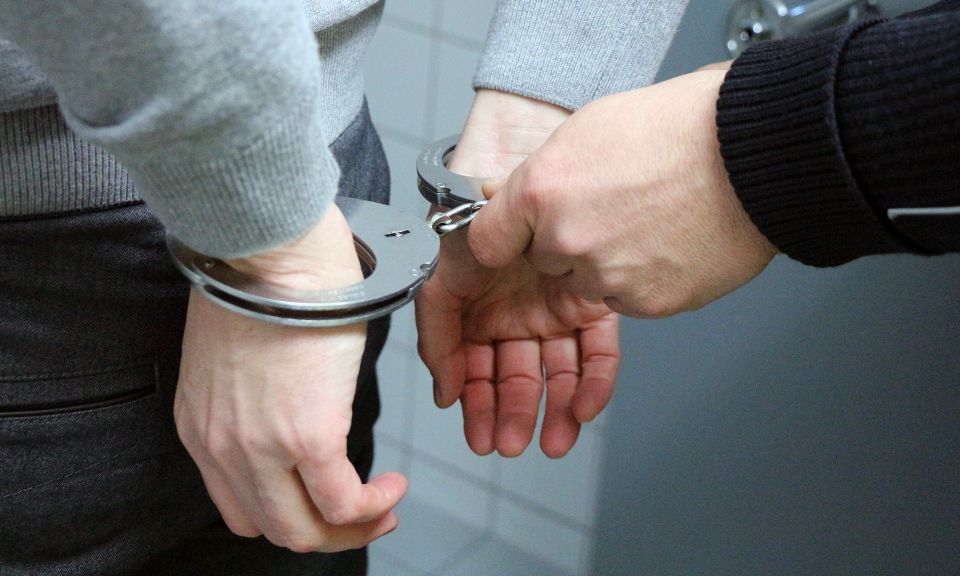Call For a Consultation (305) 373-4400
Miami Violent Crime Lawyer

Miami Violent Crime Attorney
Facing any type of criminal charges can be devastating, but the most severe charges are those that are considered violent crimes. If you or a loved one find yourselves facing one of these charges, it is imperative that you have a Miami violent crimes lawyer who knows how to navigate the criminal justice system. Often accompanied by the risk of receiving the most severe penalties, violent crime charges can leave you with many questions.
At the Law Offices of Barry M. Wax, our criminal defense attorney has the answers you are looking for. Our team has nearly four decades of experience representing clients in a variety of criminal charges. We know a conviction can be life-altering, which is why we fight aggressively to defend your rights and your freedom. When we can’t reach an acquittal, we can work to reduce your charges or have your case dismissed.
Violent Crime Laws
Violent crimes are not merely a subjective label attached to criminal charges. By law, they are defined as those crimes where the offender intentionally attempts to threaten or harm another individual. These charges are most likely to be filed as felonies, which will carry penalties that include significant jail time and fines. In addition to these penalties, a conviction will carry with it a permanent criminal record, which may make finding housing, employment, and further education difficult.
Because of the severity of the charges, they are often prosecuted most aggressively, which is why the help of an experienced and knowledgeable Miami violent crime lawyer can be critical to a positive case outcome.
The Florida 10-20-Life Law
Unfortunately, Florida often ranks among the top states for violent crimes. This is one of the reasons why the state works so aggressively when prosecuting these cases. As part of the state’s deterrent, Florida’s 10-20-Life Law has defined penalties for those who commit violent crimes. Specifically, the law outlines punishments for those crimes in which a gun is involved. Under this law, a person will:
- Receive a minimum of ten years in prison if they are in possession of a gun during the commission of a crime.
- Receive a minimum of 20 years in prison if they use a gun during the commission of a crime.
- Receive a minimum of 25 years to life if they shoot someone during the commission of a crime.
This law applies to other circumstances as well. If, for example, the crime includes any kind of weapon that is deemed a firearm or destructive device, the prosecution or the judge could seek to apply this law when sentencing.
Types of Violent Crimes
Every crime is unique in its circumstances, which could impact how the charges may be filed against you. The penalties you could face depend on those charges and the circumstances that led to them. However, there are several types of crimes that are considered violent in nature, including:
Homicide. Any premeditated, intentional killing of another individual is considered violent. Commonly referred to as murder, this can occur as a singular act or as part of committing another crime. This can include killing another during a robbery, committing sexual assault, kidnapping, and many other offenses. Acts of murder that are intentional will be charged as first- or second-degree crimes, whereas an unintentional act may be a third-degree charge.
Vehicular homicide. Like other homicides, vehicular homicide occurs when there is an intentional act to kill another human being, including unborn children, with a vehicle. This can be applied when a person who is driving a vehicle knowingly operates it in an unsafe manner. This can also be charged if you were in an accident and you failed to help any victims or left the scene of the incident.
Assisted suicide. This is often considered manslaughter, which means that one individual failed to act in a reasonable way to provide a duty of care for another. Assisting with the end of another person’s life could be considered an act of negligence.
Assault. Although this may qualify as a misdemeanor, it is still considered to be a violent crime. This charge applies whenever one individual threatens harm through violence toward another person. There must be reason to believe that the person making the threat is physically capable of carrying out the threat. If an assault occurs and a weapon is involved, the charges could be upgraded to a felony.
Kidnapping. Most often, this charge is filed as a first-degree felony. For this charge to be applicable, one individual must hold another individual against their will with the intent to frighten or harm them, use them as a means to barter or receive a ransom or disrupt a government function.
Robbery. Robbery occurs when one individual attempts to or actually steals the property of another individual. This can be in an attempt to permanently or temporarily deny the owner access to their belongings. The circumstances of the robbery will determine how the crime is classified and what type of charges will be filed. If a weapon is involved, it could be considered a first-degree felony. Without a weapon, it could be a second-degree felony.
Battery. Whenever a person causes bodily injury to another by means of nonconsensual physical touching or force, they are committing an act of battery. However, the circumstances will determine the type of charge you face. If there is a weapon involved, it could be considered a felony. Without a weapon, it may be filed as a misdemeanor.
Child abuse. If a child is involved in a crime, the prosecution will work hard for a conviction. Any act of torturing, battering, or otherwise intentionally harming a child that results in physical or mental injuries will lead to charges of felony child abuse. If the child was intentionally withheld from receiving basic needs, such as food, water, shelter, clothing, etc., the charges could be for child neglect as opposed to abuse.
Sexual assault. Any type of sexual assault is considered a violent crime. These charges are aggressively prosecuted because of the physical and mental repercussions on the victim. This crime includes any sexual activity that is nonconsensual and committed through force or the threat of force. Convictions for these crimes result in more than jail time, as they will also include registering on the sex offender database.
This list of violent crimes is not inclusive of all violent crimes. There are a multitude of circumstances and criminal behaviors that could result in these serious charges. If you or someone you love is facing any of them, however, be sure to speak with a Miami violent crime defense law firm.
Penalties for Violent Crimes
The type of charges you face and the specific crime associated with those charges will determine the type of penalties you could face. Beyond the 10-20-Life Law, violent crimes could mean extensive time in prison and significant fines. The exact penalties that you might face at sentencing are also determined by factors such as criminal history, gang affiliation, case evidence, and the use of firearms or deadly force.
Penalties for misdemeanor and felony charges in Florida include:
- Second-degree misdemeanor. Convictions for second-degree misdemeanors include up to 60 days in jail, probation for up to six months, and fines of up to $500.
- First-degree misdemeanor. Convictions are punished by up to one year in jail, up to one year of probation, and fines of up to $1,000.
- Third-degree felony. Convictions could mean up to 5 years in prison, up to 5 years of probation, and up to $5,000 in fines.
- Second-degree felony. Convictions include penalties of up to 15 years in prison, up to 15 years of probation, and up to $10,000 in fines.
- First-degree felony. Convictions are punishable by up to 30 years in prison, up to 30 years of probation, and fines of up to $10,000.
- Life felony. Convictions could mean life in prison without any possibility for parole, probation for the remainder of your life, and fines of up to $15,000.
- Capital felony. Convictions could lead to life in prison without the possibility of parole or death.
The circumstances surrounding these crimes will influence the penalties that you may receive. However, any conviction will come with a criminal record, which could keep you from finding housing, employment, and more.
Common Defenses for Violent Crimes
While the circumstances of the crime will determine which defense strategy may be needed, there are several common defense strategies that could help in your violent crime case. Determining which may be right for you begins with a thorough investigation of your case. This includes a look at the evidence, a review of police reports, reading witness statements, and more.
Common defense strategies include:
- Self-defense and defense of others. When confronted with a threat of harm to yourself or someone else, Florida law allows a person to defend themselves. However, the law states that the defense must be reasonable and match the threat. For example, if a person is hitting another with their fists and you step in to defend the victim by stabbing the perpetrator, you may not be able to claim defense of others because the reaction did not match the threat.
- Defense of property. Florida allows for the use of deadly force if you are defending your own home against those who may break into it. If you believe that your property is in danger of damage or harm by the person breaking in, the law empowers you to protect it.
- Lack of intent. Most violent crimes must show intent. Without intent, many violent crime charges cannot be applied. If the prosecution is unable to prove that the act had intent, it could mean a reduction of charges, dismissal, or acquittal.
While these are not the only ways to defend against violent crime charges, they do represent some of the strategies that your defense attorney may consider when determining how to approach your case.
FAQs
Q: How Much Does a Criminal Lawyer Charge in Miami, Florida?
A: Every case and every attorney is unique. There are many elements of each that affect how much an attorney may cost. However, the general costs of a criminal defense attorney in Miami, Florida could be upwards of $4,000. If you are facing first- or second-degree felony charges, those costs could rise as high as $35,000 or more. When first speaking with your attorney, inquire about the potential costs that you could incur.
Q: What Constitutes a Violent Crime in Miami?
A: To be considered a violent crime in Miami, FL, the act must include an intention to harm or threaten harm to another individual. This can be done through the use of verbal statements or physical acts. Violent crimes do not have to include a weapon, but many of the charges filed as violent crimes include the use or threat of a deadly weapon.
Q: What Is the Crime-of-Passion Defense in Miami?
A: When an individual is charged with first- or second-degree murder, they may be able to apply the crime-of-passion defense. Under this strategy, the defense attorney can seek to prove that the crime occurred because the accused’s mental state at the time was one of fear, anger, terror, or rage. In addition to this mental state, the defense must prove that they were provoked in some way and that the combination of both caused the crime to occur.
Q: What Are the 4 Types of Violent Crimes?
A: While there are many crimes that are considered to be violent in nature, the FBI has categorized violent crimes in four ways. These include:
- Murder and non-negligent manslaughter
- Forcible rape
- Robbery
- Aggravated assault
These categories, however, are not the only considerations for violent crimes in Florida, and you could be charged with a crime that may be outside of these four types.
Miami Violent Crimes Lawyer
Violent crimes can be particularly difficult to navigate. From the moment of your arrest, you deserve an attorney who can explain the laws surrounding your case. At the Law Offices of Barry M. Wax, our team’s experience with a variety of clients has helped us gain valuable knowledge that we can use to defend you. Our firm knows that your future is on the line, which is why we approach your case with empathy and compassion. Contact us today to find out how we can help.
Copyright © 2025 Barry M Wax PLLC. All rights reserved.












